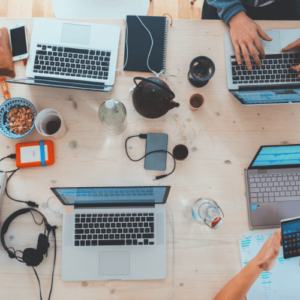Technology is everywhere. It is still developing rapidly and has become a huge part of our everyday lives.
According to the 2014 annual study conducted by Ofcom, laptop and desktop users spend a huge 31.4 hours a month, on average, browsing the internet. [1] The study also states that the average adult spends on average 8 hours 41 minutes engaged in some form of media or digital communication, whilst only sleeping an average of 8 hours 21 minutes in a 24 hour period. That means we spend over half of our waking hours staring at a device of some kind. [1]
Studies like this contribute to debates on whether modern technology is good or bad for our health, well-being and social lives.

Sleeping
For example, it has been well noted that looking at devices that emit blue light, such as mobile phones, laptops and TVs can disrupt our sleeping pattern. This is because looking at these devices can reduce the production of melatonin, the sleeping hormone. [2] It is recommended that devices are turned off about an hour before bedtime to improve your night’s sleep. This is a way in which technology may be affecting our health in a negative way.
However, there are sleeping apps designed to help you get a good night’s sleep. They attempt this by tracking your sleeping patterns, and waking you at the most natural time for your body. By waking up from a light sleep instead of in the middle of deep sleep, your body wakes more naturally and better rested. [3] This is a great way in which technology may be able to help us and our health and wellbeing. By waking up in a more natural and rested way, it puts a lot less stress on our bodies and can help us to have a happier and more productive day.
Fitness
The improvements within technology have resulted in many of us leading more sedentary lifestyles. Game consoles, TVs and computers mean that we are spending more hours sitting down using these devices, either at work or in the home. According to research in the annual Ofcom study, a UK adult will spend on average 4 hours 17 minutes a day viewing visual media. [1]
A sedentary lifestyle can increase the risk of many health problems, such as obesity, heart attack, diabetes and more. [4] However, the same knowledge has also spawned devices designed to encourage us to be more active throughout our busy days. With the development of wearable technology such as smart watches and fitness bands, we are able to keep track of our daily movements – or lack thereof.
Office work place
If, like so many of us, you work within an office environment, it can be easy to stay put at your desk and crack on! But then before you know it, hours have gone by and you haven’t looked away from your screen or moved from your desk. This can be bad for a number of reasons. Sedentary lifestyles can lead to obesity, heart problems, and – especially with desk occupations – back and eye strain. [5]
We stumbled on Eye Leo while looking into ways to prevent these possible health problems. [6] It’s a little background program that pops up and gives you small exercises to do for your eyes, which helps to reduce eye strain, aches and headaches. Eye Leo will also ‘close down’ your screen every hour (or whenever you have set it to do so) to give you a 5 minute break, encouraging you to get up from your desk and move a little. It’s a great little program, and we’ve got the whole office on it!
Social lives
The way people communicate has changed dramatically in a small space of time. Many believe that technology is isolating us, limiting our ‘face to face’ interaction, yet still making us feel popular without having built any real relationships. It’s now part of a ‘norm’ to check our personal devices even when we are being social. Updating statuses or messaging others despite having the opportunity to actually interact with physical people.
On the flip side, social media and new ways to communicate have helped bring many people together and let them stay in contact. People that live on the opposite sides of the world can stay in touch, day or night, with just a few clicks. Businesses are able to communicate with each other and their customers in new ways.
Private medical insurance & technology.
With around 93% of adults in the UK owning a mobile phone (according to the 2014 Ofcom study), PMI providers are grabbing a hold of the advantages of this by developing apps that let you talk directly to doctors, and quickly access the benefits of private healthcare. For example, if you are a Vitality Health Member you can enjoy a huge 50% discount off your monthly membership at Virgin Active health clubs. [7]
Sources:
[1] Ofom Research
[3] sleepcycle
[5] Stats on desk jobs and your health
[6] eyeleo
[7] Vitality and Virgin active


